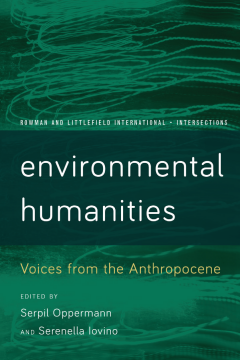
Additional Information
Book Details
Abstract
This important volume brings together scientific, cultural, literary, historical, and philosophical perspectives to offer new understandings of the critical issues of our ecological present and new models for the creation of alternative ecological futures.
At a time when the narrative and theoretical threads of the environmental humanities are more entwined than ever with the scientific, ethical, and political challenges of the global ecological crisis, this volume invites us to rethink the Anthropocene, the posthuman, and the environmental from various cross-disciplinary viewpoints. The book enriches the environmental debate with new conceptual tools and revitalizes thematic and methodological collaborations in the trajectory of ecocriticism and the environmental humanities. Alliances between the humanities and the social and natural sciences are vital in addressing and finding viable solutions to our planetary predicaments. Drawing on cutting-edge studies in all the major fields of the eco-cultural debate, the chapters in this book build a creative critical discourse that explores, challenges and enhances the field of environmental humanities.
Oppermann and Iovino have assembled a creative, diverse essay collection, international in scope, often speculative and passionate, and committed to transdisciplinarity. If the Anthropocene usually signifies boosterish techno-optimism or dire eco-apocalypse, this book offers the hope, at least, of keener intelligence about what the humanities can be as we enter an era of profound, geologic uncertainty.
Stephanie LeMenager, Moore Professor of English and Environmental Studies, University of Oregon
"If you read only one collection of essays in the new field of Environmental Humanities, you cannot currently do better than by choosing this one. It provides a great chorus of voices, a wide panorama of concepts and discourses, and a fascinating, at times troubling, exploration of the situation of humanity on an endangered planet."
Christof Mauch
Serenella Iovino is Professor of Comparative Literature at the University of Turin. Her publications include Ecocriticism and Italy (2015), Ecologia Letteraria (2006, 2015), Filosofie dell’ambiente (2004), and, as co-editor, Material Ecocriticism (2014), ContaminAzioni Ecologiche (2015) and Landscapes, Natures, Ecologies: Italy and the Environmental Humanities (forthcoming). She is a former president of the European Association for the Study of Literature, Culture and Environment.
Serpil Oppermann is Professor of English at Hacettepe University, Turkey. She is co-editor of The Future of Ecocriticism: New Horizons (2011), International Perspectives in Feminist Ecocriticism (2013), and Material Ecocriticism (2014) and editor of New International Voices in Ecocriticism (2015).
"Has our planet entered the Anthropocene? Are we leaving behind the geological era that provided the climatic conditions for the birth and flowering of civilization? If so, all the categories that informed civilization – including that of anthropos itself – will be up for review. Such a renegotiation of the very terms of our existence is a task not so much for science as for a scientifically literate, re-awakened humanities, blasted open by crisis to new horizons of imagination and to unprecedented existential responsibilities. Voices from the Anthropocene is a powerful response to this extraordinary challenge.”
Freya Matthews, Adjunct Professor of Environmental Philosophy, LaTrobe University
